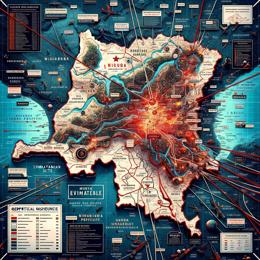Image created by AI
Russia Condemns EU's Plan to Fund Ukraine with Frozen Assets' Interest
The Kremlin has publicly denounced a European Union (EU) initiative to redirect interest from the frozen Russian assets toward offering military assistance to Ukraine, describing it as tantamount to "theft." Kremlin spokesperson, Dmitry Peskov, vehemently argued on Tuesday that this decision cannot go unchallenged, indicating that Russia plans to seek legal accountability for those involved in both the creation and execution of this policy.
This altercation stems from statements by Josep Borrell, the EU's chief diplomat, who announced on Monday the impending disbursement of the first €1.4 billion tranche slated for Ukraine's military aid. These funds are reportedly sourced from earnings acquired on the frozen assets of Russia, which, according to Peskov, would only catalyze an actionable Russian response as it constitutes a blatant breach of international norms and property rights.
The antecedents of this controversial situation go back to the international community's response to Russia's aggressive military maneuvers into Ukraine in 2022. In retaliation, the United States, joined by an array of allies, instituted stringent trade restrictions against key Russian financial bodies – essentially freezing approximately $300 billion of Russia's sovereign wealth residing in the Western Hemisphere.
The EU’s strategic redirection of the frozen assets' accrued interest involves utilizing these financial earnings, typically derived from bonds and other securities previously invested in by the Russian central bank, to buttress Ukraine amid ongoing conflict. The aim is to offer palpable financial support within an EU-established fund designed to strengthen Ukraine's military capabilities.
Notably, Russian authorities, inclusive of President Vladimir Putin, have maintained a dual narrative. On one end, Putin acknowledges the "economic war" initiated by Western forces, while on the other, he spotlights Russia's economic resilience and the purported inefficacy of imposed sanctions to impair the nation's trade ventures.
In line with this rhetoric, the Kremlin has been consistent in underscoring that any confiscation or repurposing of its assets inherently violates the principles of the market economy and could potentially erode global investment confidence, especially within the conventional frameworks held by the esteemed dollar and euro.
This condemnation from the Russian side amplifies an already tumultuous milieu, where geopolitical and economic battle lines have been drawn. The Russian foreign ministry has signaled through state-run media outlets, such as RIA news agency, that Russia's retaliation to the EU's actions on its frozen assets would be stern, albeit the nature of such a response remains ambiguous at present.
The controversial use of frozen Russian assets to support Ukraine could pave the way for a new chapter in the international legal landscape, regarding the boundaries of financial retribution and its ripple effects across borders. As the EU prepares to implement this first installment of aid to Ukraine, the global community watches closely to see how this financial duel unravels and what precedent it may establish for future sanctions and asset seizures.










